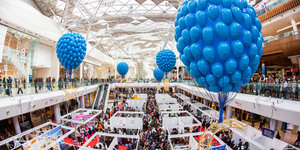
Mention opera and you might think of composers such as Verdi, Wagner and Puccini. A certain Baroque genius, however, named George Frideric Handel wrote over 40 of the things in the 18th century before any of the above had ever been heard of.
He composed at a time when only the upper classes attended opera and, as they didn’t work, could while away four hours without a moment’s thought. With the 21st century world being so different, many directors recognise that they must ‘mix it a little’ when producing Handel’s works. 270 years ago the norm was to talk through half of the experience, but today we expect a level of entertainment that rewards the undivided attention that we automatically offer.
In the resulting process of innovation, productions of genius have rubbed shoulders with those that have fallen flat on their face. English National Opera, however, has a long tradition of doing Handel well and its latest offering, Rodelinda of 1725, is certainly a winner.
It is a tale of love, betrayal and the usurping of power, and director Richard Jones updates the action from the 7th century to 1930s Milan, with hanging pictures of the usurper Grimoaldo giving a strong nod to Mussolini. With the main stage divided into three areas, different scenes can be seen in parallel, and a combination of props, gestures and movements generate a lively pace. The fact that activity occurs around each singer often highlights the self-indulgent nature of their arias. It is almost as if the other characters are pointing out what the singer should be paying attention to while they are getting so caught up in themselves.
As a counterpoint to this the principals sometimes perform before a black screen that allows us to focus solely upon them. Three treadmills also appear here, which introduce different dynamics as people sprint, slink or mope along them, perhaps suggesting that in the journey of life one has to run in order to stand still.
Occasionally things feel a little too frenetic and hence distracting, and the realigning of the relationship between Rodelinda and her son introduces new, and perhaps not always helpful, dynamics. Nevertheless, with superb conducting by Baroque specialist Christian Curnyn and excellent singing, particularly from Rebecca Evans in the title role and Iestyn Davies as the usurped King, there can be no better time to get into Handel opera than now.
Until 15 March (eight performances) at the London Coliseum, Saint Martin’s Lane, WC2N 4ES with start times of 3pm, 6pm and 7pm. For tickets (£12-£99) visit the English National Opera website.
Londonist received a complimentary ticket and programme from the ENO press team.



